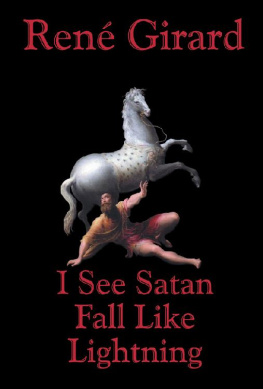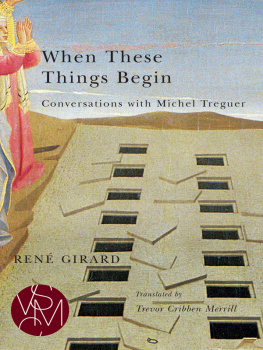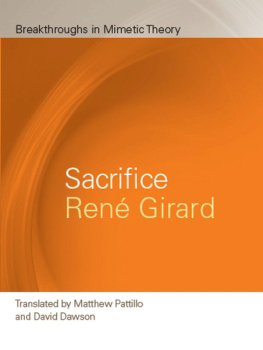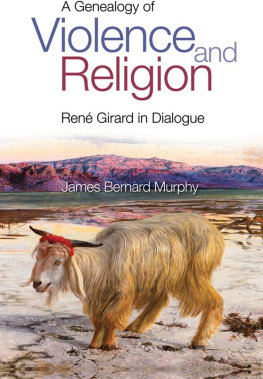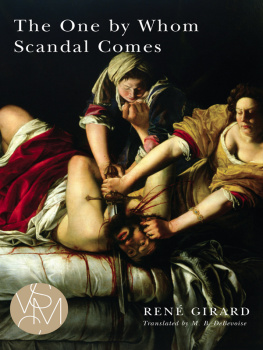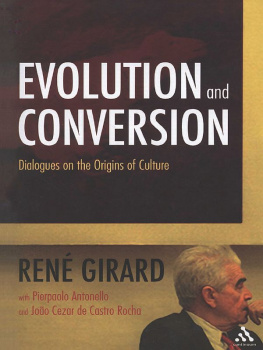René Girard - The Scapegoat
Here you can read online René Girard - The Scapegoat full text of the book (entire story) in english for free. Download pdf and epub, get meaning, cover and reviews about this ebook. year: 1989, publisher: JHU Press, genre: Religion. Description of the work, (preface) as well as reviews are available. Best literature library LitArk.com created for fans of good reading and offers a wide selection of genres:
Romance novel
Science fiction
Adventure
Detective
Science
History
Home and family
Prose
Art
Politics
Computer
Non-fiction
Religion
Business
Children
Humor
Choose a favorite category and find really read worthwhile books. Enjoy immersion in the world of imagination, feel the emotions of the characters or learn something new for yourself, make an fascinating discovery.

- Book:The Scapegoat
- Author:
- Publisher:JHU Press
- Genre:
- Year:1989
- Rating:3 / 5
- Favourites:Add to favourites
- Your mark:
- 60
- 1
- 2
- 3
- 4
- 5
The Scapegoat: summary, description and annotation
We offer to read an annotation, description, summary or preface (depends on what the author of the book "The Scapegoat" wrote himself). If you haven't found the necessary information about the book — write in the comments, we will try to find it.
The Scapegoat — read online for free the complete book (whole text) full work
Below is the text of the book, divided by pages. System saving the place of the last page read, allows you to conveniently read the book "The Scapegoat" online for free, without having to search again every time where you left off. Put a bookmark, and you can go to the page where you finished reading at any time.
Font size:
Interval:
Bookmark:
ALSO BY RENE GIRARD
Deceit, Desire, and the Novel
Critique dans un souterrain
Violence and the Sacred
Des Choses cachees depuis lafondation du monde
To double business bound: Essays on Literature, Mimesis, and Anthropology
La Route antique des hommes pervers
REN GIRARD
Translated byYVONNE FRECCERO

THIS BOOK HAS BEEN BROUGHT TO PUBLICATION WITH THE
GENEROUS ASSISTANCE OF THE ANDREW W. MELLON FOUNDATION.
1986 The Johns Hopkins University Press
All rights reserved. Published 1986
Printed in the United States of America on acid-free paper
Originally published as Le Bouc missaire, by Bernard Grasset, Paris
Editions Grasset  Fasquelle, 1982
Fasquelle, 1982
Johns Hopkins Paperbacks edition, 1989
9 8 7 6
The Johns Hopkins University Press
2715 North Charles Street
Baltimore, Maryland 21218-4363
www.press.jhu.edu
LIBRARY OF CONGRESS CATALOGING-IN-PUBLICATION DATA
Girard, Ren, 1923
The Scapegoat.
Translation of: Le bouc emissair.
Includes bibliographical references and index.
1. Violence Religious aspects Christianity. 2. Persecution. 3. Scapegoat. 4. Jesus Christ
Passion. I. Title.
BT736.15.G5613 1986 261.83315 86-2699
ISBN 0-8018-3315-9 (alk. paper)
ISBN 0-8018-3917-3 (pbk.)
A catalog record for this book is available from the British Library.
Guillaume de Machaut and the Jews
GUILLAUME DE MACHAUT was a French poet of the mid-fourteenth century. His Judgment of the King of Navarre deserves to be better known. The main part of the work is a long poem in the conventional, courtly style, but its opening is striking. Guillaume claims that he participated in a confusing series of catastrophic events before he finally closeted himself in his house in terror to await death or the end of the indescribable ordeal. Some of the events he describes are totally improbable, others only partially so. Yet the account leaves the impression that something must actually have happened.
There are signs in the sky. People are knocked down by a rain of stones. Entire cities are destroyed by lightning. Men die in great numbers in the city where Guillaume lives (he doesnt tell us its name). Some of these deaths are the result of the wickedness of the Jews and their Christian accomplices. How did these people cause such huge losses among the local population? They poisoned the rivers that provided the drinking water. Heaven-sent justice righted these wrongs by making the evildoers known to the population, who massacred them all. People continued to die in ever greater numbers, however, until one day in spring when Guillaume heard music in the street and men and women laughing. All was over, and courtly poetry could begin again.
Modern criticism, since its origin in the sixteenth and seventeenth centuries, has not relied blindly on texts. Many scholars today believe their critical insight develops in proportion to increasing skepticism. Texts that were formerly thought to contain real information are now suspect because they have been constantly reinterpreted by successive generations of historians. On the other hand, epistemologists and philosophers are experiencing an extreme crisis, which is undermining what was once called historical science. Scholars who used to sustain themselves on their texts now doubt the certainty of any interpretation.
At first glance, Guillaume de Machauts text may seem susceptible to the prevailing skepticism concerning historical certainty. But after some moments reflection even contemporary readers will find some real events among the unlikely occurrences of the story. They will not believe in the signs in the sky or in the accusations against the Jews, but neither will they treat all the unlikely themes in the same way, or put them on the same level. Guillaume did not invent a single thing. He is credulous, admittedly, and he reflects the hysteria of public opinion. The innumerable deaths he tallys are nonetheless real, caused presumably by the famous Black Death, which ravaged the north of France between 1349 and 1350. Similarly, the massacre of the Jews was real. In the eyes of the massacrers the deed was justified by the rumors of poisoning in circulation everywhere. The universal fear of disease gives sufficient weight to the rumors to unleash the massacres described. The following is the passage from the Judgment of the King of Navarre that deals with the Jews:
After that came a false, treacherous and contemptible swine: this was shameful Israel, the wicked and disloyal who hated good and loved everything evil, who gave so much gold and silver and promises to Christians, who then poisoned several rivers and fountains that had been clear and pure so that many lost their lives; for whoever used them died suddenly. Certainly ten times one hundred thousand died from it, in country and in city. Then finally this mortal calamity was noticed.
He who sits on high and sees far, who governs and provides for everything, did not want this treachery to remain hidden; he revealed it and made it so generally known that they lost their lives and possessions. Then every Jew was destroyed, some hanged, others burned; some were drowned, others beheaded with an ax or sword. And many Christians died together with them in shame.
Medieval communities were so afraid of the plague that the word alone was enough to frighten them. They avoided mentioning it as long as possible and even avoided taking the necessary precautions at the risk of aggravating the effects of the epidemic. So helpless were they that telling the truth did not mean facing the situation but rather giving in to La Fontaine, in Animals Sickened by the Plague gives an excellent description of this almost religious reluctance to articulate the terrifying term and thereby unleash some sort of evil power on the community:
The plague (since it must be called by its name)...
La Fontaine introduces us to the process of collective bad faith which recognizes the plague as a divine punishment. The angry god is annoyed by a guilt that is not equally shared. To avert the plague the guilty must be identified and punished or, rather, as La Fontaine writes, dedicated to the god. The first to be interrogated in the fable are the beasts of prey, who describe their bestial behavior, which is immediately excused. Last comes the ass, the least bloodthirsty of them all, and therefore the weakest and least protected. It is the ass that is finally designated.
According to historians, in some cities Jews were massacred at the mere mention of the plague being in the area, even before it had actually arrived. Guillaumes account could fit this sort of phenomenon, because the massacre occurred well before the height of the epidemic. But the number of deaths the author attributes to the Jews poisoning suggests another explanation. If the deaths are realand there is no reason to think they are imagined-they might well be the first victims of that same plague. But Guillaume does not think so even in retrospect. In his eyes the traditional scapegoats remain the cause of the first stages of the epidemic. Only in the later stages does the author recognize the presence of a properly pathological phenomenon. Ultimately, the disaster is so great that it casts doubt on the likelihood of a single explanation of a conspiracy of poisoners, though Guillaume does not then reinterpret the whole chain of events from a rational perspective.
Font size:
Interval:
Bookmark:
Similar books «The Scapegoat»
Look at similar books to The Scapegoat. We have selected literature similar in name and meaning in the hope of providing readers with more options to find new, interesting, not yet read works.
Discussion, reviews of the book The Scapegoat and just readers' own opinions. Leave your comments, write what you think about the work, its meaning or the main characters. Specify what exactly you liked and what you didn't like, and why you think so.

